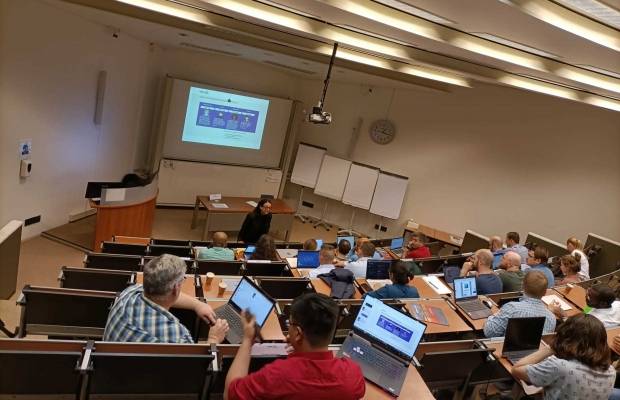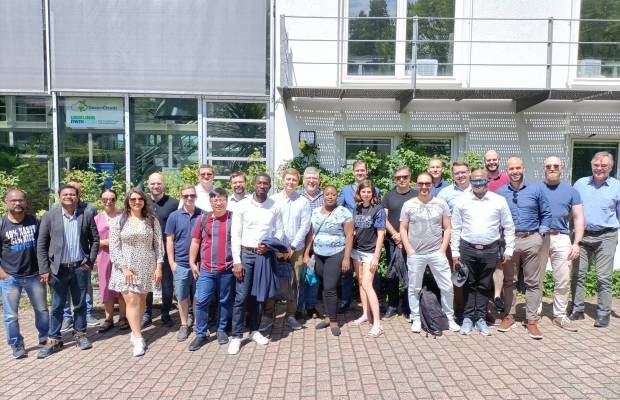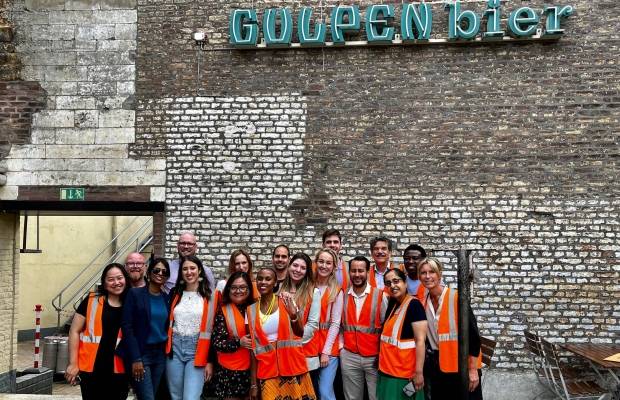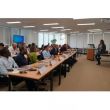MSM MBA Summer School 2022 – harmonizing academic knowledge with practical exposure
From 11-25 June 2022, MSM organized its annual MBA Summer School welcoming 110 students coming from 34 different countries. The Summer School offered the students the opportunity to follow five MBA Expertise Tracks at the MSM campus in Maastricht, The Netherlands.
“The summer school provided a great opportunity to participate in interactive seminars with foreign professors and great thinkers in an open, relaxed and friendly environment,” said László Vastag, student from the Corvinus-MSM-SEED Executive MBA program.
During the two weeks of summer school, MSM brought together students from different MBA programs - the Online MBA, Executive MBA, Full-time MBA, and global partner MBA programs. The diversity of the program was reflected not only in the composition of the students but also in 19 different lecturers coming from 11 different countries. The five different Expertise Tracks included Accounting & Finance, Digital Economy, Entrepreneurship, International Business & Sustainable Development, and Supply Chain Management.
Oluseyi Akinnibosun, student from the Full-Time MBA program, says that the course content, the social interaction, and exposure to industry experts offered during the Summer School was valuable. It was, however, a bittersweet experience for Oluseyi as “wrapping up the in-class part of the MBA program feels a bit sad.” Talking about the lectures offered during the Summer School, Oluseyi feels it was insightful to listen to industry experts talking about activities, direction, and the trajectory of the industries they operate in.
Major learning outcomes For Executive MBA student Alexandre Gomes Caetano, the opportunity to meet different people from all over the world resulted in an enriching experience. Alexandre specialized in International Business & Sustainable Development and says that the major learning outcome of the expertise track was to know how small sustainable actions can significantly change and impact the value chain of a business.
For Executive MBA student Alexandre Gomes Caetano, the opportunity to meet different people from all over the world resulted in an enriching experience. Alexandre specialized in International Business & Sustainable Development and says that the major learning outcome of the expertise track was to know how small sustainable actions can significantly change and impact the value chain of a business.
Full-time MBA student Dinesh Chelattil followed the Supply Chain Management expertise track. For Dinesh the highlight of the courses were the simulation games that provided a realistic setting in a competitive class environment. “The simulations included a range of roles and responsibilities that depicted the players within a realistic supply chain environment and provided ample opportunity to test the theoretical content against practical applications,” Dinesh adds.
László has been thinking about starting a new venture but was a bit unsure about how to make the leap to entrepreneurship: “I now feel empowered to formulate my ideas better with the tools and methods acquired during the course. I have got to a decision-making point and I am potentially ready for making the next step in my career,” he said after following the Entrepreneurship expertise track.
Full-Time MBA student Shuvam Gosh, who followed the Supply Chain Management expertise track, said that the key takeaway was meeting new people who have industry experience in supply chain and using their guidance to combine theoretical knowledge with previous work experience to find a job that suits requirements and personality.
Insightful guest lectures
Oluseyi says the guest lecturers were “a gem” of the program. “In my case (Digital Economy expertise track), we had access to renowned industry experts. We were able to interact with them. Importantly, we learned not only from their lectures but also from responses to questions asked by fellow classmates.”
László says the Summer School offered a diverse selection of lecturers who excelled in different areas of the business and could provide insights from real-life experience.
Nikolina Lukačić Petrović from the Corvinus-MSM-SEED Executive MBA enjoyed the guest lecture provided by the N+P Group in the International Business & Sustainable Business expertise track, which provided really good insights.
As part of the guest lectures, Alexandre had a unique opportunity to visit one of the most sustainable breweries in Europe and spent a valuable time discussing the sustainability aspect of businesses.


Group Assignments and teamwork skills
László thinks working in groups sparked new ideas and resulted in team dynamics as professors challenged students’ skills during assignments. For Dinesh, the diversity of the class in terms of academic backgrounds, knowledge, and job functions across multi-functional industries contributed to thought-provoking discussions and presentations relating to the supply chain concepts and their applicability. Alexandre says group assignments honed the critical thinking skills of students as they had to deal with case analyses of businesses and companies.
For Nikolina the biggest value of the group assignments was the opportunity to collaborate with colleagues who were diverse in many ways, providing totally new perspectives. “We were mixed groups, from different continents, different industrial backgrounds and different experiences, and this enriches the overall experience,” she explains.
Sharing his experience working on group assignments, Shuvam says: “The courses 'Managing Supply Chain Trade-offs' and 'Sustainable Supply Chains for the Future' had group activities that involved working for a company through a simulation. Each group had four roles to play: Sales, Finance, Purchase and Supply Chain. The motive was to improve the ROI and circular economy of a loss-making company in a sustainable manner. It was enriching working with the groups in different roles in each of the simulations. We learned how to apply our theoretical knowledge in practical scenarios through the simulations. Working with the Executive MBA students and fellow students from Reutlingen, Germany opened new channels of the thinking process. The full-time MBA students brought academic knowledge and the Executive MBA students brought practical exposure which helped the groups to sail through each simulation process by combining the knowledge from each area. Professors like Ed Week and Bart de Vos created an environment that stimulated the participation of students and encouraged discussions and questions which were beneficial for the long run.”
MSM MBA Summer School 2023
Do you want to be part of the interactive and diverse learning experience of the MBA Summer School? The 2023 edition of the MBA Summer School will take place from 17 June to 1 July 2023. More information will soon be available here.

